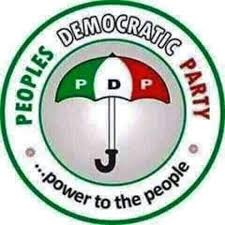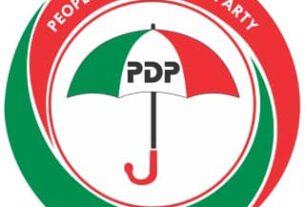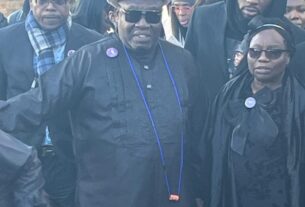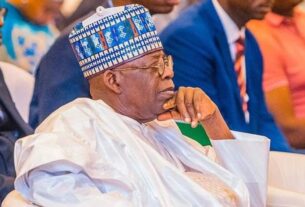November 17, 2024

… Says It’s Reviewing Outcome of Poll.
The Peoples Democratic Party and indeed all lovers of democracy in Nigeria and across the world have just witnessed the worst election conducted by the Independent National Electoral Commission (INEC).
The November 16, 2024 Governorship election in Ondo State runs short of all expectations and requirements of a free, fair and credible election as it witnessed the height of electoral swindle, deceit and manipulation by the All Progressives Congress (APC).
This election witnessed widespread election merchandising, monetization and barefaced vote buying by the APC and its apparatus in government to suppress the genuine aspiration of the people.
This devious practice by the APC was rampant and pervasive because the APC have utterly impoverished Nigerians and turned poverty into a weapon of mass subjugation which enabled it to manipulate the election and its outcome.
We call the attention of all Nigerians and the International Community to this reprehensible practice by the APC as widely witnessed in the November 16, 2024 Governorship election in Ondo State and we demand that a serious action be taken to stem such if Nigeria’s democracy must survive.
In the meantime, the National Working Committee (NWC) of the PDP will be having a more detailed review of the election and its outcome and take appropriate action in the defence of our Democracy.
Signed:
Hon. Debo Ologunagba
National Publicity Secretary
STATE HOUSE PRESS STATEMENT
FORMER PRESIDENT OBASANJO WAS NOT AN IDEAL LEADER TO EMULATE
In a recent display of his characteristic self-importance, former President Olusegun Obasanjo once again took to the public stage to bestow his unsolicited wisdom on leadership and governance in Nigeria. From his lofty perch, he blamed those who served after his tenure for the nation’s myriad challenges.
Unfortunately, the former leader’s habit of casting aspersions on every subsequent administration has devolved into a recurring pastime, overshadowing the expectation of an elder statesman to join a constructive dialogue on attaining national progress.
In his latest critique of the administration of President Muhammadu Buhari, whom he pejoratively called ‘Baba Go Slow’ and President Bola Tinubu, who he tagged ‘Emilokan’, Chief Obasanjo used the platform provided by Chinua Achebe Leadership Forum at Yale University to unfurl his latest treatise on leadership and public morality. He also used the forum to write off Nigeria as a failing country.
The irony of Chief Obasanjo using the platform that celebrates Achebe to sermonise on the ideals of good governance, statecraft, economic management, and corruption should be apparent to discerning minds. When he was alive, Chinua Achebe was a universally acclaimed moral, cultural and literary icon with scant regard for Obasanjo.
It is on record that Professor Achebe rejected the third highest national honour bestowed on him by the Obasanjo-led administration in 2004 on the grounds of the prevalence of abuse of power, corruption, poor leadership, and, in particular, state-sponsored brigandage endorsed by Chief Obasanjo in Achebe’s home state of Anambra. In Anambra, the former president actively supported the abduction of a sitting governor, Dr Chris Ngige, by non-state actors led by Chris Uba, a younger brother of Obasanjo’s senior aide.
In rejecting the 2004 national honour by the Obasanjo administration, Achebe declared: “Nigeria’s condition today under your watch is…too dangerous for silence. I must register my disappointment and protest by declining to accept the high honour awarded me in the 2004 honours list.”
Brazen illegality and assault on the Constitution of Nigeria reached a disturbing height under the leadership of Chief Obasanjo. During Obasanjo’s era, the unconstitutional impeachment of four governors who belonged to his party occurred. The governors impeached by minority members of the Houses of Assembly were Joshua Dariye of Plateau, Rashidi Ladoja of Oyo, Ayodele Fayose of Ekiti and Diepreye Alamieyeseigha of Bayelsa. A man under whose watch all of these egregious infractions occurred should certainly not be the one to give any lecture on leadership and corruption. He should not be taken seriously as he reeks of profound hypocrisy of the worst form.
Former President Obasanjo has continuously pumped himself up as the economic wizard of Nigeria. But a reality check showed he was nothing of such. He left unresolved many, if not all, of the problems of Nigeria, which he itemised in his lecture. He even recently admitted that his government made a mistake by not focussing on gas development, as the Tinubu administration does today. All oil and gas players know that Nigeria has more gas than oil. The only positive of the Obasanjo era was fiscal and monetary policy management buoyed by a consistent rise in crude oil prices throughout his eight-year tenure. This rise in crude oil prices started in 2000 and peaked in 2013 when it reached over 100 dollars per barrel before a decline in 2014, which set the oil-dependent economy downward. The current economic crisis the All Progressives Congress administrations have been battling since 2015 is the product of the poor choices in economic management made by Obasanjo and the two successors from his party. Obasanjo prides his government on paying the $15 billion debt owed to the Paris Club. Still, it was not a wise decision as it was done when the country’s critical economic infrastructure across sectors was in shambles.
While oil receipts brought money into the country, Obasanjo failed to fix the deplorable federal roads or expand the national road network. He did not repair the Lagos-Ibadan expressway, the Lagos-Abeokuta road leading to his hometown in Abeokuta, the Otta-Idiroko road, and many others.
His administration also should have paid more serious attention to universities and polytechnics. In a joint vote of no confidence in our tertiary institutions, Obasanjo and his deputy, Atiku Abubakar, sought to profit from their weaknesses by establishing their private universities. As a sitting President, Chief Obasanjo abused his office to advance personal interest against the spirit and letters of our constitution when he corralled leading businessmen, women and government contractors to donate billions of naira for his Olusegun Obasanjo Presidential Library and Resorts in Abeokuta and his Bell University in Otta.
After wasting billions of naira on a failed third-term project in 2007, Chief Obasanjo hurriedly organised a sham electoral process that would go down in history as the most fraudulent election held in Nigeria since 1960. The beneficiary of the sham election, Umaru Yar’adua, admitted that the election was seriously flawed and, as Justice Muhammed Uwais’s panel recommended, worked towards electoral reforms. It is hypocrisy writ large when a man who presided over the worst election in Nigeria demands the sack of the leadership of the Independent National Electoral Commission.
For eight years, the Obasanjo administration made no significant investment in security by modernising the Armed Forces. He did not redesign the national security architecture or change the military doctrine. The most critical investment in our armed forces, especially the military, since the administration of President Shehu Shagari in 1980 was made by the APC-led administration of President Buhari from 2015-2023. When President Buhari assumed office in 2015, the Air Force had fewer than three serviceable fighter jets, and the Navy barely had one serviceable vessel. Within eight years, President Buhari acquired over 40 new fighter jets of different capabilities, including 12 Tucano jets. He also acquired naval ships to strengthen the Navy. The APC administration of Buhari developed the air wings of the Army and Navy and changed the entire Armed Forces into one of the most potent fighting forces in the world.
President Tinubu has continued to sustain the same support and funding to the military and other security agencies. It is the reason the country is winning in the multi-pronged fight against Boko Haram terrorists, bandits, kidnappers, and other perpetrators of violent crimes. In the last year, over 400 terror and bandit kingpins have been eliminated, and thousands of Nigerians have been freed from their abductors. The insecurity that engulfed Nigeria started under the Obasanjo administration with militancy and kidnapping of expatriate oil workers in the Niger Delta, which later became a festering wound from which the nation has not recovered. Boko Haram, which became a violent movement in 2009, began its build-up under Obasanjo’s regime.
On matters of integrity, honesty, and morality in public leadership, Chief Obasanjo is certainly not a paragon of virtue for anyone to model after. Nigerians can still remember the messy public spat between Chief Obasanjo and his then-vice president, Atiku Abubakar, over PTDF money that led to a Senate Public Hearing in 2004. The sordid details of the public hearing included unsettling evidence of how Obasanjo instructed his Vice President to buy Sport Utility Vehicles for his mistresses with PTDF funds. There was also the Halliburton bribe scandal, which the US Congress probe revealed. Bribe payments were made to the highest political authorities at the Villa while Obasanjo was in charge.
Nigerians will also remember how the Obasanjo administration invested $16 billion on electricity, which left the country in utter darkness. The colossal amount spent on power was so embarrassing that President Umaru Musa Yar’Adua, Obasanjo’s successor, ordered a probe. Similarly, Obasanjo’s privatisation programme was scandalous. It did not deliver real value for the country. His administration cheaply sold national assets to cronies who stripped the assets of the state-owned enterprises. A case in point was the aluminium smelter company ALSCON in Ikot-Abasi, Akwa-Ibom State, built by the military government at the princely sum of $ 3.2 billion. It was sold for 130 million dollars. Obasanjo also sank money into Turn Around Maintenance of our refineries, which never worked, leading to the massive importation of refined petroleum products.
Such was the miasma of corruption under Obasanjo that the former governor of Abia, Orji Uzor Kalu, his party member, petitioned the EFCC, accusing Obasanjo of gross abuse of office.
If Chief Obasanjo had addressed the many problems he critiqued in his poorly written Yale lecture when he ruled Nigeria for eight years, President Buhari and President Tinubu would have had a much lighter burden of fixing the country.
While the Tinubu administration diligently works to overcome the country’s economic challenges, it would be better and more advisable for former President Obasanjo to temper his self-righteousness in his public discussions regarding our nation’s temporary difficulties. Instead, his remaining years would be better spent reflecting on the missed opportunities during his own time in leadership, both as military head of state and civilian president.
Bayo Onanuga
Special Adviser to the President
(Information & Strategy)
November 18, 2024
STATE HOUSE PRESS STATEMENT
PRESIDENT TINUBU APPROVES RESTRUCTURING OF MEDIA AND COMMUNICATIONS TEAM
President Bola Tinubu has re-designated the positions of two recently appointed officials in the State House media and communications team to enhance efficiency within the government’s communication machinery.
The restructuring is as follows:
- Mr. Sunday Dare – hitherto Special Adviser on Public Communication and National Orientation is now Special Adviser, Media and Public Communications.
- Mr. Daniel Bwala – announced last week as Special Adviser, Media and Public Communication, is now special adviser Policy Communication.
These appointments, along with the existing role of Special Adviser, Information and Strategy , underscore that there is no single individual spokesperson for the Presidency.
Instead, all the three Special Advisers will collectively serve as spokespersons for the government.
This approach aims to ensure effective and consistent communication of government policies, decisions, and engagements.
Bayo Onanuga
Special Adviser to the President
(Information and Strategy)
November 18, 2024
STATE HOUSE PRESS RELEASE
AT THE G20 SUMMIT IN BRAZIL, PRESIDENT TINUBU ENDORSES THE LAUNCH OF THE GLOBAL ALLIANCE AGAINST HUNGER AND POVERTY
President Bola Tinubu has hailed the creation of the Global Alliance Against Hunger and Poverty, championed by President Luiz Inacio Lula da Silva of Brazil.
Tinubu described the alliance as pivotal in the global fight against hunger and poverty.
He made this statement on Monday at the 19th G20 Leaders Summit opening session in Rio de Janeiro, Brazil.
He lauded the initiative and described it as the right step to address one of the world’s most significant challenges.
“This bold and visionary step underscores Brazil’s leadership in addressing one of the most urgent and persistent challenges facing our world today.
“The creation of this Alliance marks a significant milestone in our global efforts to eradicate hunger and poverty, and it also sends a powerful message of solidarity to vulnerable populations around the globe.
“By fostering collaboration between governments, international organisations, and civil society, this initiative offers a comprehensive approach not only to addressing immediate needs but also tackling the structural causes of hunger and poverty,” he said.
President Tinubu compared this global initiative to one of the eight priority areas he outlined at his inauguration 18 months ago, expressing Nigeria’s eagerness to adopt international best practices to advance its economic development.
According to President Tinubu, Nigeria’s endorsement of the declaration of commitment to join the Global Alliance is a significant step in its efforts to address hunger and poverty by leveraging international cooperation and resources to bolster domestic strategies.
He added that by supporting the initiative, Nigeria also demonstrates a solid commitment to realising the Sustainable Development Goals (SDGs), particularly SDG 1, which focuses on eradicating poverty, and SDG 2, which aims to achieve zero hunger.
“These goals are at the core of Nigeria’s development agenda, and the Alliance offers a platform to accelerate progress towards them.
“By collaborating with international partners, Nigeria aims to leverage best practices, innovative solutions, and financial support to enhance its efforts to combat poverty and hunger. The endorsement reinforces Nigeria’s role as a key player in global efforts to promote sustainable development and improve the quality of life for all its citizens,” President Tinubu said.
President Tinubu emphasised the urgent need for the United Nations Security Council reform to ensure its continued relevance in global interventions.
He reiterated Nigeria’s readiness and capability to represent Africa within this elite.
He called on the G20 to champion this noble ideal, having admitted the African Union as a group member.
Tinubu said, “ The Security Council should expand its permanent and non-permanent member categories to reflect the world’s diversity and plurality. Africa deserves priority in this.
“The Security Council should expand its permanent and non-permanent member categories to reflect the world’s diversity and plurality better.
“Africa deserves priority in this process, and two permanent seats should be allocated to it with equal rights and responsibilities. Nigeria stands ready and willing to serve as a representative of Africa in this capacity.”
In the statement read on his behalf by the Minister of Foreign Affairs, Ambassador Yusuf Tuggar, President Tinubu noted that the G20 now wears a toga of a forward-looking international institution that upholds reform-minded multilateralism.
He especially commended the decision by the G20 to grant permanent membership to the African Union and for its consistency in sustaining the tradition of inviting guest countries to join the group.
This broad participation, he said, allows the opportunity for more inclusive and effective discussions to address shared global challenges.
“Some permanent members of the Council have shown promising signs of support for this process, which is a positive development. We welcome this shift in attitude and call for a faster pace to the long overdue change.
“The world faces various challenges, including extreme poverty, inequality, climate change, terrorism, and global conflicts.
“These issues are exacerbated by longstanding inequities in the global governance system, which have led to unsustainable sovereign debt and distortions in access to capital markets, trade imbalances, unfair representations and hindered development in the Global South.
“It is our responsibility to find pragmatic solutions to fix these imbalances.
“Particularly pressing is global taxation, which profoundly impacts developing countries.
“The current international tax system, largely shaped by the interests of more affluent nations, often leaves developing countries at a disadvantage, especially in taxing digital economies.
“This systemic imbalance has led to significant revenue losses, hampering our efforts towards sustainable development and economic self-reliance,” the Nigerian leader said.
President Tinubu highlighted that Nigeria, alongside other African Group member states, championed a historic initiative at the United Nations: calling for a framework Convention on Tax to establish a more equitable and inclusive global tax system.
He urged the G20 to heed the call by countries, especially those of the global South, to reform the international financial architecture.
“Multilateral institutions must be revamped to bridge the gap between the Global North and South. This is the path for the future and one the G20 must champion. Nigeria is committed to being part of that future through active participation in the G20 and our steadfast support for achieving SDG 2030 targets,” the President added.
Bayo Onanuga
Special Adviser to the President
(information & Strategy)
November 19, 202


